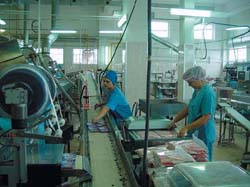
Photo: Oksana Dorofeeva
Production conveyor at the Aquavit company in Ilyichevsk City, Odessa county.
“Since the beginning of our collaboration with the Institute in March 2003, we have achieved a lot, especially in the development and implementation of HACCP standards.”
– Andrey Mikhailov, Director of Aquavit plant
|
Initiative
USAID funded training for Aquavit personnel in HACCP and helped them develop a HACCP plan to address food-safety and quality-control issues. The plan underwent a technical audit conducted by a Louisiana State University AgCenter seafood specialist who found that costly microbiological testing along the entire food processing line did not allow Aquavit to address food quality issues, and at times, the company marketed food that was unsafe.
Aquavit implemented the HAACP audit results by reconstructing and expanding their facility. The plant was equipped with modern fish-processing equipment and a second production line was added that doubled Aquavit’s capacity. The plant was reconstructed according to HACCP requirements. Special attention was paid to improving product and process record-keeping, putting in tile floors and walls in place of concrete, and increasing the number of daily floor and wall washes.
|
|
Results
Now that Aquavit could deliver products which met international standards through the adoption of HACCP, the company doubled its production capacity. This enabled Aquavit to increase local market share by 20% and enter export markets in Romania and Moldova. In 2003, production increased by 400 tons per month, leading to an increased annual demand for raw materials totaling $4.5 million. Over the year, additional sales reached $9 million and a gross profit of $4.5 million. The plant expansion led to creation of more than sixty new jobs, and new employees earned approximately $95,000 in wages during the first year. The company plans to increase its market share in all three countries, and in the future to expand to other Black Sea markets.
Print-friendly version of this page (257kb - PDF)
|
|


